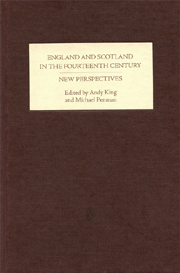Book contents
- Frontmatter
- Contents
- List of Contributors
- Acknowledgements
- Abbreviations
- 1 Introduction: Anglo-Scottish Relations in the Fourteenth Century – An Overview of Recent Research
- 2 The English Army and the Scottish Campaign of 1310–1311
- 3 ‘Shock and Awe’: The Use of Terror as a Psychological Weapon during the Bruce–Balliol Civil War, 1332–1338
- 4 The Scots and Guns
- 5 Edward Balliol: A Re-evaluation of his Early Career, c. 1282–1332
- 6 Scoti Anglicati: Scots in Plantagenet Allegiance during the Fourteenth Century
- 7 Best of Enemies: Were the Fourteenth-Century Anglo-Scottish Marches a ‘Frontier Society’?
- 8 Dividing the Spoils: War, Schism and Religious Patronage on the Anglo-Scottish Border, c.1332–c.1400
- 9 The Pope, the Scots, and their ‘Self-Styled’ King: John XXII's Anglo-Scottish Policy, 1316–1334
- 10 Sovereignty, Diplomacy and Petitioning: Scotland and the English Parliament in the First Half of the Fourteenth Century
- 11 National and Political Identity in Anglo-Scottish Relations, c.1286–1377: A Governmental Perspective
- 12 Anglici caudati: abuse of the English in Fourteenth-Century Scottish Chronicles, Literature and Records
- 13 Anglo-Scottish Relations in the Later Fourteenth Century: Alienation or Acculturation?
- Index
7 - Best of Enemies: Were the Fourteenth-Century Anglo-Scottish Marches a ‘Frontier Society’?
Published online by Cambridge University Press: 12 September 2012
- Frontmatter
- Contents
- List of Contributors
- Acknowledgements
- Abbreviations
- 1 Introduction: Anglo-Scottish Relations in the Fourteenth Century – An Overview of Recent Research
- 2 The English Army and the Scottish Campaign of 1310–1311
- 3 ‘Shock and Awe’: The Use of Terror as a Psychological Weapon during the Bruce–Balliol Civil War, 1332–1338
- 4 The Scots and Guns
- 5 Edward Balliol: A Re-evaluation of his Early Career, c. 1282–1332
- 6 Scoti Anglicati: Scots in Plantagenet Allegiance during the Fourteenth Century
- 7 Best of Enemies: Were the Fourteenth-Century Anglo-Scottish Marches a ‘Frontier Society’?
- 8 Dividing the Spoils: War, Schism and Religious Patronage on the Anglo-Scottish Border, c.1332–c.1400
- 9 The Pope, the Scots, and their ‘Self-Styled’ King: John XXII's Anglo-Scottish Policy, 1316–1334
- 10 Sovereignty, Diplomacy and Petitioning: Scotland and the English Parliament in the First Half of the Fourteenth Century
- 11 National and Political Identity in Anglo-Scottish Relations, c.1286–1377: A Governmental Perspective
- 12 Anglici caudati: abuse of the English in Fourteenth-Century Scottish Chronicles, Literature and Records
- 13 Anglo-Scottish Relations in the Later Fourteenth Century: Alienation or Acculturation?
- Index
Summary
In august 1388 a force of northern Englishmen was overwhelmed at the battle of Otterburn, in Redesdale, Northumberland. Writing shortly after the event, a monk at Westminster Abbey sought to explain this defeat. He attributed it partly to the ‘impetuous spirit and excessive audacity’ of Sir Henry Percy, and partly to the failure of the bishop of Durham to turn up with his forces. But in addition, he wrote, the English were defeated:
because the darkness deluded our Englishmen so much that when they struck carelessly at a Scotsman, due to the chorus of voices speaking a single language, they struck down an Englishman.
Writing some eighty years earlier, the northern chronicler Walter of Guisborough had described similar confusion, when a Scottish raiding party defeated another northern English force near Wark-on-Tweed in Northumberland, at Easter 1296, in a skirmish which marked the outbreak of the Scottish wars. He relates that the Scots had arranged a password, so as to be able to distinguish friend from foe. However, many of the English simply repeated the passwords themselves and so escaped by pretending to be Scots. As these examples demonstrate, the men on both sides of the Anglo-Scottish borders spoke the same northern dialect of English. They also shared the same culture, and indeed, for most of the thirteenth century, the border had been of very little political or cultural significance, and cross-border links had flourished and multiplied.
- Type
- Chapter
- Information
- England and Scotland in the Fourteenth CenturyNew Perspectives, pp. 116 - 135Publisher: Boydell & BrewerPrint publication year: 2007



